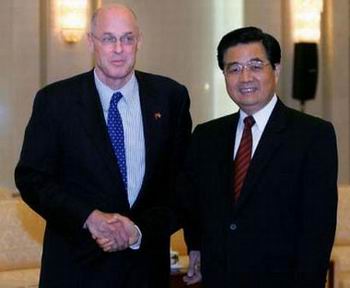Source: Xinhuanet
09-22-2006 15:58
 |
Chinese President Hu Jintao, right, shakes hands with U.S. Treasury Secretary Henry Paulson, left, during their meeting at the Great Hall of the People in Beijing September 22, 2006. Photo: Reuters
Chinese President Hu Jintao and Premier Wen Jiabao gave a warm welcome to U.S. Treasury Secretary Henry Paulson in Beijing Friday, and highlighted the "strategic economic dialogue" in addressing long-term economic relations between the two countries.
"China and the United States have jointly announced the establishment of the China-U.S. economic strategic dialogue. The two sides should have in-depth discussions on bilateral and global strategic economic issues under the dialogue mechanism," Hu said.
Hu said the economic dialogue would help "make suggestions for high-level policy-making by the two nations".
Vice Premier Wu Yi and Paulson, as special representatives of President Hu and U.S. President George W. Bush, will co-chair the talks.
They will convene twice-yearly in Beijing and Washington, with the first meeting to be held before the end of 2006.
Hu suggested the economic strategic dialogue, along with existing China-U.S. dialogue mechanisms, such as the Joint Commission on Commerce and Trade and Joint Economic Committee, serve the purpose of "deepening bilateral trade and economic cooperation and promoting common development".
"China will make joint efforts with the United States to expand common interests, respect and address each other's concerns to push forward the China-U.S. constructive partnership," Hu added.
Paulson had made "positive contributions to exchanges and cooperation between our two countries in the economic and financial field", said Hu.
After a 30-minute discussion, Hu and Paulson held private talks for about 15 minutes, but the topics of their conversation have not been disclosed.
Speaking on the launch of the Strategic Economic Dialogue, Premier Wen said economic and trade relations were important to the Sino-U.S. relationship.
He predicted the closer China-U.S. trade ties would exert a bigger influence on the world economy, saying the dialogue would help defuse misunderstanding and increase cooperation between the two countries.
Wen stressed the dialogue mechanism should follow the principles of mutual respect, equality and mutual benefit, and cover significant bilateral and global economic issues.
A Chinese expert regarded the new mechanism is a rational choice for China and the United States.
"The mechanism provides a good opportunity for both sides to fully communicate and exchange views, and will play a positive role in improving communication channels and reducing disputes between the two sides," said Mei Xinyu, of the Trade Research Institute of the Ministry of Commerce.
Agreeing with Wen's view on the dialogue mechanism, Paulson regarded its establishment as an "historical event" for bilateral relations, pointing out the United States would make concerted efforts with China to improve the mechanism at a strategic level.
The two sides also discussed issues such as China-U.S. trade relations and China's policy of opening to the outside world.
Trade relations should maintain stability and stamina of growth and the two sides should take each other's concern into full consideration, Wen said, expressing his confidence that problems in bilateral trade could be resolved if the two sides followed the principles he proposed.
China would remain committed in its path of reform and opening up and continue to promote reforms of economic, political, cultural and social structures, Wen said.
"China can not develop alone and we will adhere to the basic policy of opening to the outside world," Wen said, pledging that the policy "will never change".
The United States had noted China's concerns and was willing to join with China to properly address the issues in a bid to maintain the healthy and stable development of relations, Paulson said.
The United States supported China's opening-up policy and believed the policy would not only serve China's interests, but was also conducive to creating opportunities for the Unites States and other countries, Paulson said.
Paulson, 60, was nominated in May to replace former Treasury Secretary John Snow, who resigned June 29. The former Goldman Sachs CEO was sworn in on July 10. He made more than 70 trips to China as head of the investment giant.
Paulson arrived in Beijing on Wednesday to continue his four-day China visit.
During his stay in Beijing, leaders and officials from the National Development and Reform Commission and the Ministries of Finance, Commerce, Health, and Information Industry are scheduled to meet or hold talks with him.
Editor:Du Xiaodan
